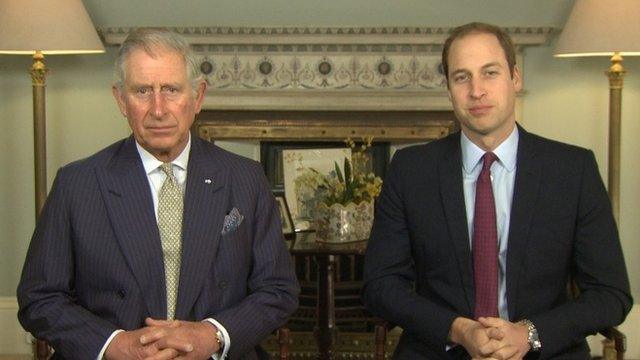Prince William in plan to tackle wildlife trafficking
- Published
Prince William said Africa's wild elephants and rhinos could be extinct before his daughter Charlotte's 25th birthday
The Duke of Cambridge has unveiled plans to help the global transport industry crack down on illegal wildlife trafficking routes.
A declaration was signed by 40 companies at Buckingham Palace, to tackle criminals moving horn, ivory and other animal parts for huge profits.
Signatories include bosses of shipping firms, airlines and customs operators.
Prince William said the Buckingham Palace Declaration was a "game-changer in the race against extinction".
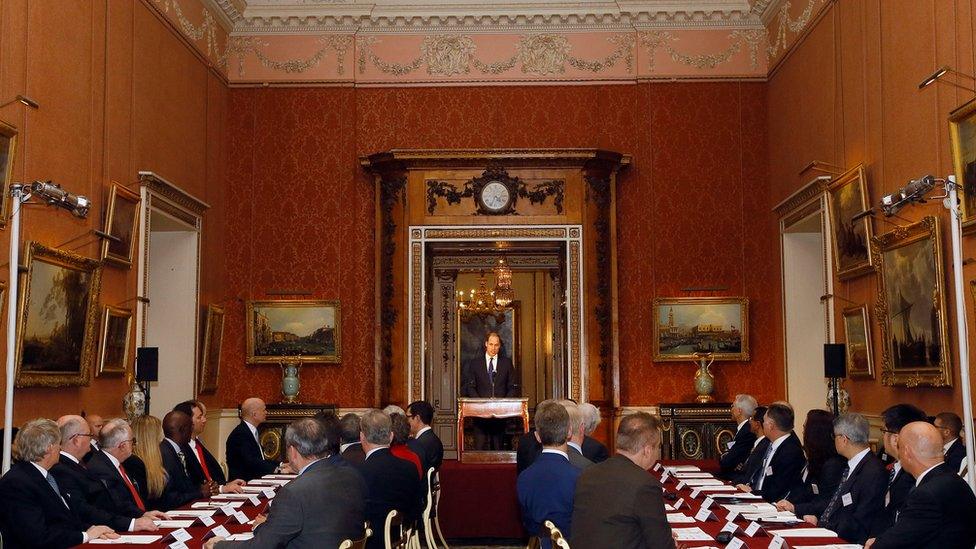
Prince William told the organisations signing up to the agreement: "We cannot afford to waste a single day"
The duke, who in a TV interview before the announcement also addressed criticisms he was a "workshy prince", told the signatories the poaching crisis was unique because tackling it had widespread support.
"We have faced up to the fact that if current trends continue, the last wild African elephants and rhinos will be killed before my daughter Charlotte reaches her 25th birthday," he said.
"Everyone agrees that losing these animals from the wild would be a disaster for humanity. This means that halting this crisis is only a test of our will. The question is: can we be bothered to do our bit?
"By signing this declaration, you, the leaders of some of the most important transportation companies and agencies on earth are answering with an emphatic, 'yes'."
He warned that if the crisis was not turned around within the next five years, the battle would be lost forever.

On the poaching front line
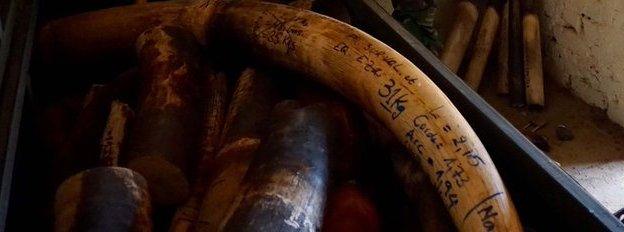
By BBC Africa correspondent Alastair Leithead
Garamba in the north of the Democratic Republic of Congo (DRC) is one of Africa's oldest national parks but has lost more than 90% of its elephants.
It covers 14,000 sq km but has fewer than 100 rangers protecting its elephants from heavily armed groups crossing from South Sudan, Joseph Kony's Lord's Resistance Army from Uganda, and other poachers from the DRC and Sudan.
In the 1970s there were 22,000 elephants, but today there are only 1,200-1,400 left. And the Northern White Rhino, for which Garamba was given World Heritage status, has already been wiped out by poaching.
Garamba National Park is now managed by African Parks, which is arming and training rangers to counter the threat.
They go out on regular foot patrols and have aircraft to monitor movements in the park, but often find the carcasses of elephants, with those responsible long gone.
The park has few tourists and so its management is paid for by a European Union grant and by private donors.
African Parks hopes it will be sustainable in the future, but fears it will take many years because of the security threat and the instability around the park.

Lord Hague of Richmond, who was part of the taskforce behind the agreement, said the most effective answer to the problem was to end the demand for the illegal goods - but while that work went on the team had looked at ways to prevent their transportation.
He said it was a complex area, with 500 million containers shipped around the world every year and more than 100,000 flights every day, but "action was possible" and the declaration would target the "chain between suppliers and consumers".
"It is nearly too late to save our rhinos, elephants, tigers, and other iconic species, but it is not quite too late," he said.
"It will require our combined efforts, resolve, and intensified determination - and that is what this declaration is about."
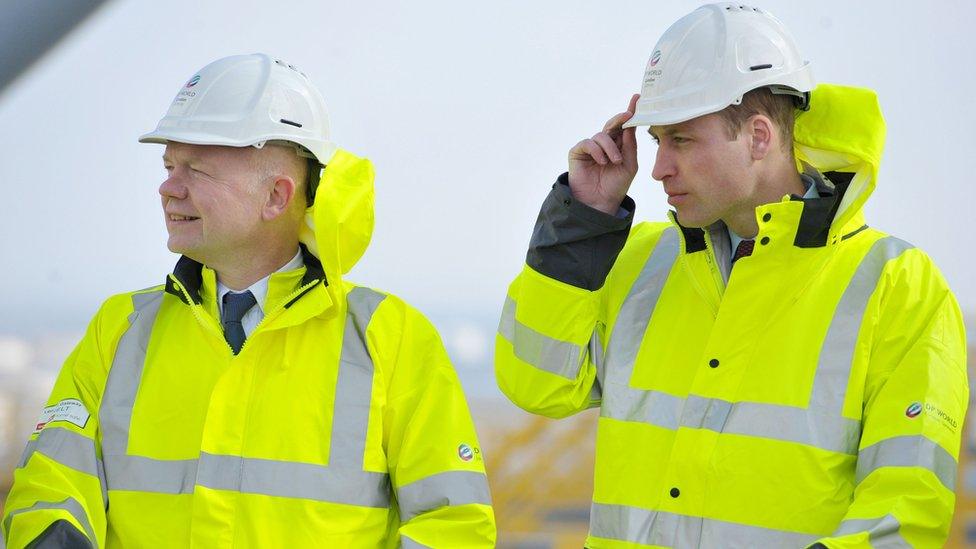
Prince William and Lord Hague visited the London Gateway port to highlight the new agreement
Richard Thomas, from the wildlife trade monitoring network Traffic, said the focus had been on protecting the animals at the source - by employing more rangers and giving them better equipment and training - and on inspections at exit and entry points.
Transportation was a "vital piece of the puzzle" and another point of intervention, he said.

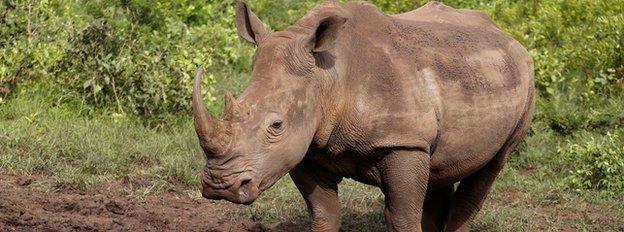
The threat of wildlife trafficking
Illegal wildlife trade covers a wide range of animals and plants. Animals are killed for their meat, skin and body parts and used for a variety of purposes, including medicine and decoration
Valued at between £3bn-£13bn, it is the fourth most lucrative global crime after drugs, humans and arms
It is one of the biggest threats to the survival of some of the world's most threatened species, including rhinos, elephants and tigers
95% of the world's rhinos have been lost in the last 40 years - powdered rhino horn is used in traditional Asian medicine as a supposed cure for a range of illnesses from hangovers to fevers and even cancer
22,000 African elephants were killed by poachers for their ivory in 2012. The ivory is carved into ornaments and jewellery - China is the biggest market for such products
3,200 tigers may be left in the world
Source: WWF, external and United for Wildlife, external

The declaration contains 11 commitments, including a database highlighting the routes being used to move illegal animal products and wildlife, and the method of transport - so companies can report concerns to the authorities.
It is the culmination of a year's work by the United for Wildlife Transport Taskforce - which was convened by the prince and chaired by the Conservative peer and former Foreign Secretary Lord Hague. It consisted of representatives from the transport industry, non-governmental organisations (NGOs) and governments from various countries around the world.
Signatories included Emirates Airline, Qatar Airways, World Wildlife Fund - UK, the World Customs Organisation and industry bodies such as the International Air Transport.
'Part of the job'
Prince William is president of United for Wildlife - an alliance between seven of the world's most influential conservation organisations and The Royal Foundation of the Duke and Duchess of Cambridge and Prince Harry.
In an interview with ITV about the poaching crisis, the prince was also asked about recent press articles suggesting he was not carrying out enough royal duties.
The 33-year-old had been dubbed a part-time royal after it was reported he had undertaken 87 appearances in the UK last year and 35 on overseas trips, compared with his elderly grandfather the Duke of Edinburgh, who carried out 250.
"It's part of the job," he said of the accusations, external.
He went on to explain how engagements to highlight his campaigns took "a lot of planning and a lot of knowledge-building, a lot of conversations".
"I didn't want to get to 45 or 50 and sit back and say, 'I could have said something about that issue but I didn't because I worried about what people thought or what people said'," he added.
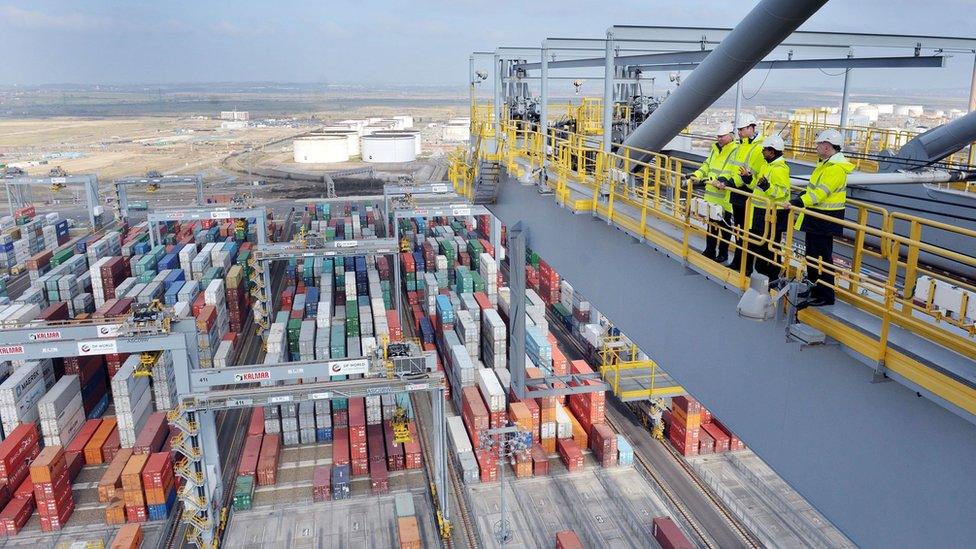
The prince's visit to the port took place on Monday, ahead of the signing of the declaration
- Published4 March 2015
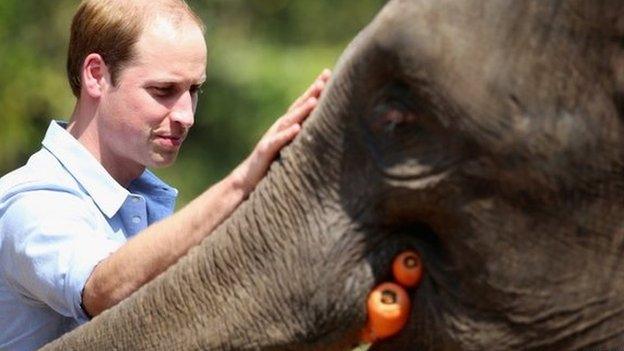
- Published19 October 2015
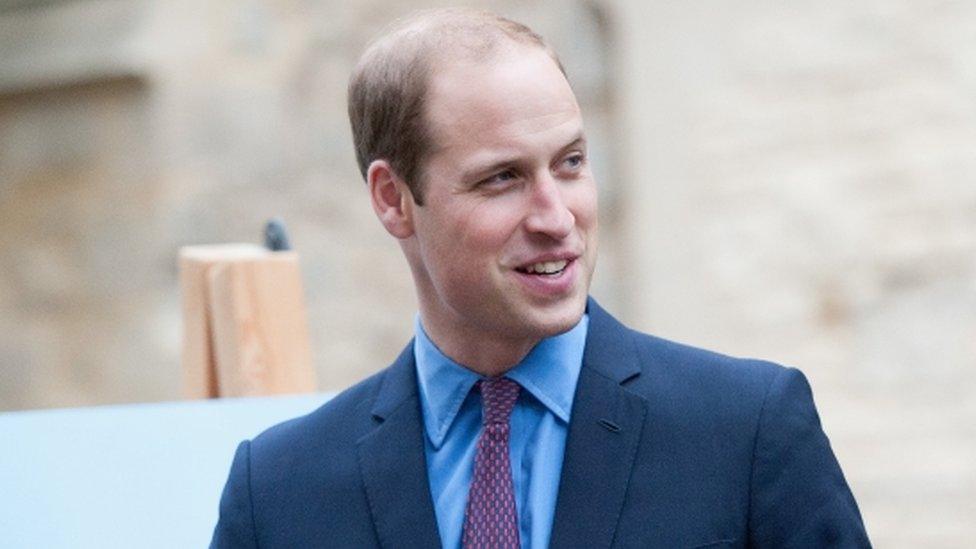
- Published9 February 2014
